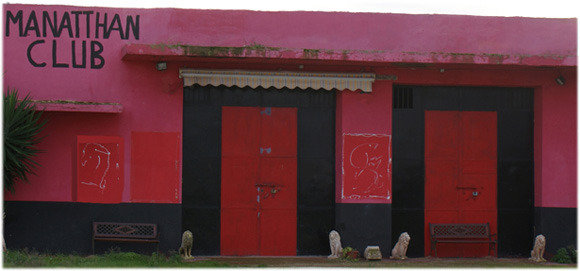Flavio Favelli
dal 21/11/2011 al 14/1/2012
Segnalato da
21/11/2011
Flavio Favelli
Cardi Black Box, Milano
Manatthan Club. L'artista compie un atto di riappropriazione di alcuni oggetti che hanno caratterizzato la storia dell'Italia e dei consumi a cavallo fra gli anni '60 e '70, restituendo una narrazione personale delle trasformazioni socio-culturali nel Bel Paese.

curated by Art At Work
Flavio Favelli (1967) develops his art practice through the intimate and personal relationship that he establishes with objects, images and furniture that he ceaselessly collects in flea markets and vintage dealers around Italy. He assembles and disassembles, cuts and mounts diverse objects and pieces of furniture creating an aesthetically dense universe loaded with melancholic beauty. The resulting objects and installations are charged with emotional, personal and cryptical suggestions that allow a subtle form of poetry to emerge. His large collages of stamps and postcards mounted in vintage frames, the patchworks of carpets and curtains seem to record in a personal way the passage of time, creating a very individual synthesis between painting, sculpture and installation. For his first solo show in Milan ‘Manatthan Club’, Favelli shows us, reappropriating some specific objects that marked the history of Italian consumer culture in the late ’60s and ’70s, the portrait of a provincial Italian way of life, kitsch and at the same time genuine, still capable of dreaming through the signs of consumerism, (logos of renowned brands and neon signs), the existance of a distant and better world.
The title ‘Manatthan Club’, that intentionally reports an orthographic mistake, comes from a photo taken by Favelli in Spring 2011 (and chosen as the invitation for the show) to a club the artist bumped into in Sicily on thehighway that links Licata to Gela. This non-place with its name misspelt in black block capitals on a fuchsia and red wall evoked in Favelli the promise of transgression and entertainment associated to the myth of the american metropolis. The same unexpected combination of colours returns compulsively in the pieces of furniture transformed in light boxes by neon lights as well as in the logos and in the different objects that conjure, as the artist himself claims: “…my imaginary and the one of a country, Italy, that verges on a provincial-trash-popsouth”.
The works that quote Sandokan, the artist’s personal hero as a child, are revealing. Favelli at the age of nine became passionate of the adventures of the Tiger of Mompracem interpreted by Kabir Bedi in the Rai tv serial of 1976. The serial was an unprecedented success (they account 27 millions viewers) becoming in a short time a cult for young Italians and giving birth to the first national phenomenon of merchandising on a large scale through t-shirts, school notebooks, carnival masks and a very sought-after stickers’ album by Panini. Favelli appropriates this myth that has been recently brought to the media’s attention as police discovered it was the mafia boss Francesco Schiavone’s code name.
The show in Milan is structured in two different spaces; in the main gallery the pieces of furniture with the neon lights installed together with the logos of the companies that marked the Italian market in the ’70s, create a surreal atmosphere, full, through the use of red and fuchsia, and through the elaboration of porn film adds of sensuality. At Level One the artist chose to transform the space into a boudoir with carpets and curtains where the collages of images and stamps and silks of Pucci’s foulards are installed as in an eighteenth century picture gallery, evoking a absurd sense of spacial and temporal displacement.
Thus Favelli’s show becomes a personal narrative of the socio-cultural transformations of the Bel Paese. It presents next to each other images drawn from porn movies of the ’70 and commercial logos, driving thus the viewer to think about the perverse need to own useless things and how contemporary consumer culture has become more obscene.
However this show doesn’t stand as a form of a social critique, but as the reflection on a national past in whichdesire was not commodified or exploited and in which, maybe in a provincial way, consumers were still dreaming through the possession of precious foreign objects of a different modern and better future.
Press office:
Paola Manfredi tel +39 335 5455539 @ press@paolamanfredi.com
Opening: November 22nd 2011, 7pm
Cardi Black Box Gallery
Corso di Porta Nuova, 38 - Milan
Hours: Mon–Sat: 10am–7pm
Free admission



